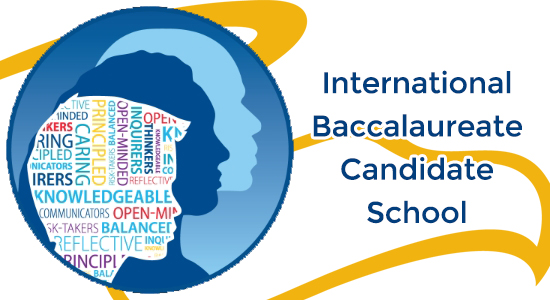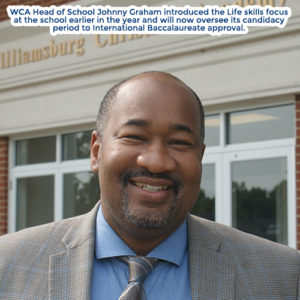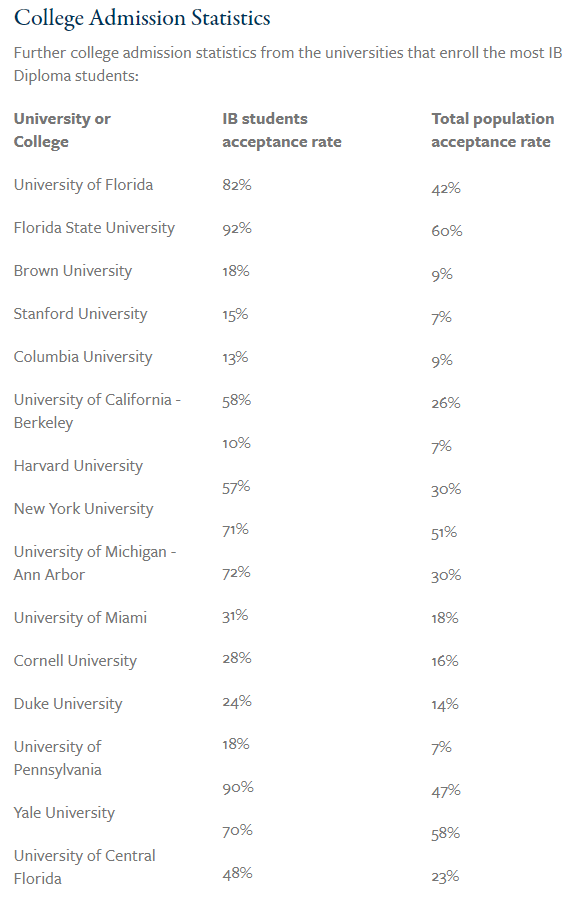Williamsburg Christian Academy Receives Candidacy to Become an International Baccalaureate School

- April 24, 2020
- 2019-2020, Academics, Announcements, Arts, College Admissions & Scholarships, Community Service, Extracurriculars, Head of School, Lower School News, Middle School News, Upper School News
- admissions, candidate, IB, ibo.org, International Baccalaureate, ivy league, johnny graham, Life skills, subject exams, Theory of Knowledge
Williamsburg Christian Academy has officially been named a candidate school for the renowned International Baccalaureate® (IB) program. The candidacy includes all three of their programs in the college preparatory category: the Primary Years Program (PYP) for children from preschool to fifth grade; the Middle Years Program (MYP) for students grades six to ten; and the Diploma Program (DP), an optional program for students in their junior and senior year of high school. Training is set to begin for teachers in the PYP and MYP in early May and has already commenced for the DP. The training will continue throughout the summer. If all goes well, WCA is hoping to be authorized as an International Baccalaureate School in the fall for both the PYP and MYP. The target for authorization for the Diploma Program, which requires a significantly higher quantity of training, is the Fall of 2021. All freshman (Class of '23) and below at WCA currently would be eligible to elect the Diploma program under that timeline.
About the International Baccalaureate Organization
According to its website, the International Baccalaureate organization was founded in 1968. From its outset, it sought to provide a challenging yet balanced education that would facilitate  geographic and cultural mobility by providing an internationally recognized university entrance qualification and would also serve the deeper purpose of promoting intercultural understanding and respect. With the introduction of the Middle Years Program in 1994 and the Primary Years Program in 1997, the IB identified a continuum of international education for students aged 3 to 19. These programs focus on teaching students to think critically and independently and how to inquire with care and logic. The IB prepares students to succeed in a world where facts and fiction merge in the news, and where asking the right questions is a crucial skill that will allow them to flourish long after they've left their programs. They are supported by International Baccalaureate teachers and coordinators who develop and promote the IB's curriculums in over 5,000 schools globally every day, in over 150 countries around the world.
geographic and cultural mobility by providing an internationally recognized university entrance qualification and would also serve the deeper purpose of promoting intercultural understanding and respect. With the introduction of the Middle Years Program in 1994 and the Primary Years Program in 1997, the IB identified a continuum of international education for students aged 3 to 19. These programs focus on teaching students to think critically and independently and how to inquire with care and logic. The IB prepares students to succeed in a world where facts and fiction merge in the news, and where asking the right questions is a crucial skill that will allow them to flourish long after they've left their programs. They are supported by International Baccalaureate teachers and coordinators who develop and promote the IB's curriculums in over 5,000 schools globally every day, in over 150 countries around the world.
The Impact of IB and a Life Skills-Based Education

The school has already shifted towards a far greater emphasis on life skills and is set to incorporate that emphasis already this fall. Wednesdays at WCA for Upper School students will consist not of traditional class periods, but of elective club periods, a class Bible study, and two seminars for credit on a collection of basic life skills-oriented topics. These could range from dinner etiquette to managing credit card debt, basic automotive care, or how to write a professional email. This life skills emphasis is encapsulated in the school's new seven pillars model, characteristics that WCA will be working to instill in each of its graduates: Christ-centeredness, stewardship, communication, awareness, inquiry-led innovation, respect, and wellness. The school feels that its emphasis on these life skills and characteristics is more extensive than what traditional educational environments offer (although some universities are seeing the crisis in their students not having necessary life skills... so much so that they have started offering 'Adulting' courses).
Elements of International Baccalaureate Programs
Similarly, The International Baccalaureate® program aims to do more than other curricula by developing inquiring, knowledgeable, and caring young people who are motivated to succeed. The IB strives to develop students who will build a better world through intercultural understanding and respect. Throughout all IB programs, students develop approaches to learning skills and the attributes of the IB learner profile, a target of characteristics that the program seeks to develop in its students, many of which dovetail with WCA's stated seven pillars. The program endeavors to develop students who become inquirers, communicators, and risk-takers who are knowledgeable, principled, open-minded, caring, balanced, and reflective.
As mentioned before (and also per their website), students in IB are able to take responsibility for their own learning and understand how knowledge itself is constructed; this is further reinforced through IB's unique theory of knowledge (TOK) course. Students through that course and others are encouraged to try different approaches to learning and to take responsibility for their own educational progress. The program also, in its nature as a system rooted with an international focus, emphasizes multilingualism. "International Baccalaureate's platform, coupled with WCA's Christ-centered and child-centric learning approach, guides students to excel in their adult careers and face life's challenges, challenges we've all experienced during the pandemic of 2020," added Graham, with a specific reference to how much this shift will benefit students in what is sure to be an altered reality in the years to come. "We accomplish this through the development of one's Christ-centered walk and relationship with the Lord, the practice of approaches to learning, self-management instruction, analysis of data, innovative thinking, metacognitive inquiry, and awareness of changes in the world around them."
Benefits of Graduating From the Diploma Program
At its core, the IB seeks to help students ask challenging questions, think critically, and develop research skills proven to help them in higher education. The International Baccalaureate® (IB), 
Community Service Segment of IB Already a WCA Requirement
IB programs also encourage students to be active in their communities and to take their learning beyond academic study. In this area, the track of a WCA student will not differ that much from that of an International Baccalaureate student. WCA already has a specific hours requirement for community service activity, and students in higher grades often travel for mission trips to help those in need both domestically and internationally.
Training For Authorization
As mentioned, to teach IB programs, schools must be authorized. Every school authorized to offer IB programs is known as an IB World School. WCA's Head of School Johnny Graham is no stranger to the International Baccalaureate model. He helped institute the Diploma Program at his former position as Head of Springdale Prep, (a school he helped found as well) and is already an actively qualified DP Coordinator. Current Upper School Assistant Principal Crystal Florakis and Graham will certify in the Middle Years Program this late Spring, with Florakis ultimately becoming the MYP Coordinator. Lower School Principal Michelle Flanagan has been tapped as the Primary Years Program Coordinator and will be certified next month. All teacher certification in IB is permanent and does not expire. IB Professional Development for those qualified teachers is continuous and occurs every twelve to fifteen months.
Anticipated Enrollment Growth
Williamsburg Christian Academy expects that news of this transition, especially amongst those who place a high value on academic rigor and well-rounded curricula as well as the newly integrated life skills emphasis, will result in growth in almost every grade level. WCA is accepting applications for all grades at this time for the 2020/2021 school year, and interested families can reach their Admissions Officer Cassie Bradshaw to talk through options for enrollment, discounts, and scholarships, as well as offering a live virtual tour of the school. Families interested in potentially enrolling at WCA, or who would like to get more information about the school should contact her at admissions@williamsburgchristian.org or visit our website and fill out our Interest form (click to be taken directly to either site). The school also has several IB teaching positions open for the fall. Candidates are encouraged to check the WCA website for more information and to download an application. Inquiries should be directed to hos@williamsburgchristian.org.
Williamsburg Christian Academy Receives Candidacy to Become an International Baccalaureate School

- April 24, 2020
- 2019-2020, Academics, Announcements, Arts, College Admissions & Scholarships, Community Service, Extracurriculars, Head of School, Lower School News, Middle School News, Upper School News
- admissions, candidate, IB, ibo.org, International Baccalaureate, ivy league, johnny graham, Life skills, subject exams, Theory of Knowledge
Williamsburg Christian Academy has officially been named a candidate school for the renowned International Baccalaureate® (IB) program. The candidacy includes all three of their programs in the college preparatory category: the Primary Years Program (PYP) for children from preschool to fifth grade; the Middle Years Program (MYP) for students grades six to ten; and the Diploma Program (DP), an optional program for students in their junior and senior year of high school. Training is set to begin for teachers in the PYP and MYP in early May and has already commenced for the DP. The training will continue throughout the summer. If all goes well, WCA is hoping to be authorized as an International Baccalaureate School in the fall for both the PYP and MYP. The target for authorization for the Diploma Program, which requires a significantly higher quantity of training, is the Fall of 2021. All freshman (Class of '23) and below at WCA currently would be eligible to elect the Diploma program under that timeline.
About the International Baccalaureate Organization
According to its website, the International Baccalaureate organization was founded in 1968. From its outset, it sought to provide a challenging yet balanced education that would facilitate  geographic and cultural mobility by providing an internationally recognized university entrance qualification and would also serve the deeper purpose of promoting intercultural understanding and respect. With the introduction of the Middle Years Program in 1994 and the Primary Years Program in 1997, the IB identified a continuum of international education for students aged 3 to 19. These programs focus on teaching students to think critically and independently and how to inquire with care and logic. The IB prepares students to succeed in a world where facts and fiction merge in the news, and where asking the right questions is a crucial skill that will allow them to flourish long after they've left their programs. They are supported by International Baccalaureate teachers and coordinators who develop and promote the IB's curriculums in over 5,000 schools globally every day, in over 150 countries around the world.
geographic and cultural mobility by providing an internationally recognized university entrance qualification and would also serve the deeper purpose of promoting intercultural understanding and respect. With the introduction of the Middle Years Program in 1994 and the Primary Years Program in 1997, the IB identified a continuum of international education for students aged 3 to 19. These programs focus on teaching students to think critically and independently and how to inquire with care and logic. The IB prepares students to succeed in a world where facts and fiction merge in the news, and where asking the right questions is a crucial skill that will allow them to flourish long after they've left their programs. They are supported by International Baccalaureate teachers and coordinators who develop and promote the IB's curriculums in over 5,000 schools globally every day, in over 150 countries around the world.
The Impact of IB and a Life Skills-Based Education

The school has already shifted towards a far greater emphasis on life skills and is set to incorporate that emphasis already this fall. Wednesdays at WCA for Upper School students will consist not of traditional class periods, but of elective club periods, a class Bible study, and two seminars for credit on a collection of basic life skills-oriented topics. These could range from dinner etiquette to managing credit card debt, basic automotive care, or how to write a professional email. This life skills emphasis is encapsulated in the school's new seven pillars model, characteristics that WCA will be working to instill in each of its graduates: Christ-centeredness, stewardship, communication, awareness, inquiry-led innovation, respect, and wellness. The school feels that its emphasis on these life skills and characteristics is more extensive than what traditional educational environments offer (although some universities are seeing the crisis in their students not having necessary life skills... so much so that they have started offering 'Adulting' courses).
Elements of International Baccalaureate Programs
Similarly, The International Baccalaureate® program aims to do more than other curricula by developing inquiring, knowledgeable, and caring young people who are motivated to succeed. The IB strives to develop students who will build a better world through intercultural understanding and respect. Throughout all IB programs, students develop approaches to learning skills and the attributes of the IB learner profile, a target of characteristics that the program seeks to develop in its students, many of which dovetail with WCA's stated seven pillars. The program endeavors to develop students who become inquirers, communicators, and risk-takers who are knowledgeable, principled, open-minded, caring, balanced, and reflective.
As mentioned before (and also per their website), students in IB are able to take responsibility for their own learning and understand how knowledge itself is constructed; this is further reinforced through IB's unique theory of knowledge (TOK) course. Students through that course and others are encouraged to try different approaches to learning and to take responsibility for their own educational progress. The program also, in its nature as a system rooted with an international focus, emphasizes multilingualism. "International Baccalaureate's platform, coupled with WCA's Christ-centered and child-centric learning approach, guides students to excel in their adult careers and face life's challenges, challenges we've all experienced during the pandemic of 2020," added Graham, with a specific reference to how much this shift will benefit students in what is sure to be an altered reality in the years to come. "We accomplish this through the development of one's Christ-centered walk and relationship with the Lord, the practice of approaches to learning, self-management instruction, analysis of data, innovative thinking, metacognitive inquiry, and awareness of changes in the world around them."
Benefits of Graduating From the Diploma Program
At its core, the IB seeks to help students ask challenging questions, think critically, and develop research skills proven to help them in higher education. The International Baccalaureate® (IB), 
Community Service Segment of IB Already a WCA Requirement
IB programs also encourage students to be active in their communities and to take their learning beyond academic study. In this area, the track of a WCA student will not differ that much from that of an International Baccalaureate student. WCA already has a specific hours requirement for community service activity, and students in higher grades often travel for mission trips to help those in need both domestically and internationally.
Training For Authorization
As mentioned, to teach IB programs, schools must be authorized. Every school authorized to offer IB programs is known as an IB World School. WCA's Head of School Johnny Graham is no stranger to the International Baccalaureate model. He helped institute the Diploma Program at his former position as Head of Springdale Prep, (a school he helped found as well) and is already an actively qualified DP Coordinator. Current Upper School Assistant Principal Crystal Florakis and Graham will certify in the Middle Years Program this late Spring, with Florakis ultimately becoming the MYP Coordinator. Lower School Principal Michelle Flanagan has been tapped as the Primary Years Program Coordinator and will be certified next month. All teacher certification in IB is permanent and does not expire. IB Professional Development for those qualified teachers is continuous and occurs every twelve to fifteen months.
Anticipated Enrollment Growth
Williamsburg Christian Academy expects that news of this transition, especially amongst those who place a high value on academic rigor and well-rounded curricula as well as the newly integrated life skills emphasis, will result in growth in almost every grade level. WCA is accepting applications for all grades at this time for the 2020/2021 school year, and interested families can reach their Admissions Officer Cassie Bradshaw to talk through options for enrollment, discounts, and scholarships, as well as offering a live virtual tour of the school. Families interested in potentially enrolling at WCA, or who would like to get more information about the school should contact her at admissions@williamsburgchristian.org or visit our website and fill out our Interest form (click to be taken directly to either site). The school also has several IB teaching positions open for the fall. Candidates are encouraged to check the WCA website for more information and to download an application. Inquiries should be directed to hos@williamsburgchristian.org.



